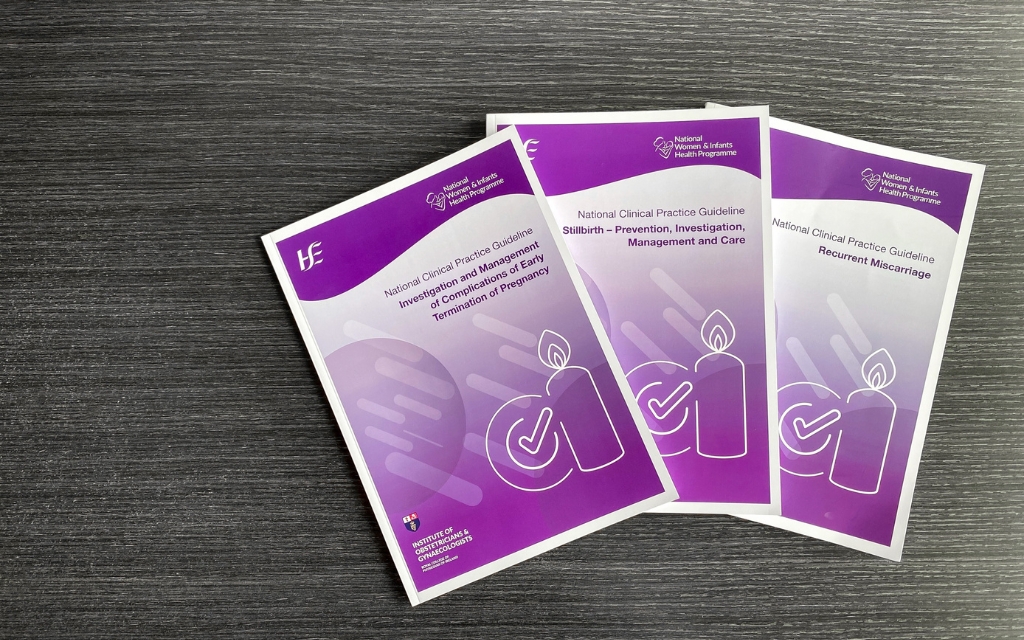National Clinical Guidelines
The challenge
Clinical practice guidelines synthesise the best available evidence to assist healthcare practitioners, service users, policymakers and other stakeholders to make informed decisions, with the aim of improving care quality and patient outcomes.
Clinical guidelines can assist in the standardisation of care. Research on all areas of pregnancy loss has shown variation in access, provision and care quality.
National clinical guidelines were developed from 2010 to 2016 through the National Clinical Programme for Obstetrics and Gynaecology, a joint initiative between Health Service Executive (HSE) Clinical Strategy and Programmes Divisions.
A new clinical guideline programme was established by the HSE’s National Women and Infants Health Programme in mid-2021.
The older programme guidelines required updating, and new guidelines were required for topics not previously addressed, including recurrent miscarriage.
Our work
Led by Professor Keelin O’Donoghue (Clinical Lead) and Ms Nicolai Murphy (Programme Manager), the National Clinical Practice Guidelines in Obstetrics and Gynaecology are a programme of work between the National Women and Infants Health Programme, HSE and the Institute of Obstetricians and Gynaecologists of the Royal College of Physicians of Ireland.
Guidelines produced
In January 2023, the first 12 updated Clinical Practice Guidelines in Obstetrics & Gynaecology were published. Each guideline is accompanied by a summary document to support healthcare professionals, and a plain language summary. Further guidelines were published in 2024 and 2025.
Amongst these were several guidelines relating to pregnancy loss, and these involved members of the Pregnancy Loss Research Group (PLRG), amongst others.
Recurrent Miscarriage: Dr Laura Linehan (lead author), Marita Hennessy PhD (co-author), Professor Keelin O’Donoghue (senior author).
Fifty-eight recommendations regarding: the structure and organisation of recurrent miscarriage care; supportive care; investigations; treatments; future pregnancy planning.
Research from the Health Research Board-funded RE:CURRENT (Recurrent miscarriage: Evaluating current services) Project was used to inform the development of this guideline. This included a systematic review of recurrent miscarriage guidelines, interviews with key stakeholders (including professional and lived experience perspectives), national care experience survey, national service evaluation, and an economic analysis).
Stillbirth: Prevention, Investigation, Management and Care: Dr Aisling McDonnell (lead author), Tamara Escañuela Sánchez (co-author), Riona Cotter (co-author), Dr Margaret Murphy (co-author); Professor Keelin O’Donoghue (senior author).
145 recommendations across seven areas: risk factors; diagnosis; investigations; management; classification, audit and review; follow-up; looking to the future.
Much PLRG research contributed to this guideline, including large streams of work on stillbirth definitions; behavioural risk factors for stillbirth (RELEVANT); pregnancy after stillbirth; impact of stillbirth on health care staff and parents; impacts of COVID-19 in pregnancy; parental decision-making around perinatal autopsy; staff education and training (TEARDROP); attendance at perinatal mortality meetings; perinatal death reviews, inquiries and audits; public awareness of stillbirth.
Investigation and Management of Complications of Early Termination of Pregnancy: Dr Sophie Boyd (lead author); Dr Deirdre Hayes-Ryan (senior author).
A year in review of termination services conducted by PLRG members highlighted varying practice in the management of complications of termination of pregnancy, and the need for national guidance.
This guideline contains 23 recommendations across nine areas: following medical termination of pregnancy - change of mind, absence of bleeding, continuing pregnancy, pain; haemorrhage; incomplete termination of pregnancy; infection; surgical complications; psychosocial considerations.
Research conducted by PLRG members informed implementation considerations, namely the need for ongoing education, training and assessment, where required, to provide a safe service, in addition to ensuring standardisation of services nationally.
First Trimester Miscarriage: Dr Clare Crowley (lead author), Niamh Spillane (co-author), Dr Deirdre Hayes-Ryan (co-author), Professor Keelin O’Donoghue (senior author).
This guideline contains 43 recommendations across nine areas: assessment, diagnosis, management of miscarriage, histopathological examination, complications of miscarriage and/or its management, bereavement and supportive care, follow-up and future pregnancy planning, organisation and provision of services, education.
The Diagnosis and Management of Ectopic Pregnancy: Professor Keelin O’Donoghue, Dr Deirdre Hayes-Ryan, Dr Caroline Joyce.
This guideline contains 42 recommendations across nine areas: investigation of ectopic pregnancy, diagnosis of ectopic pregnancy, tubal ectopic pregnancy management, interstitial ectopic pregnancy, cervical ectopic pregnancy, caesarean scar pregnancy, ovarian ectopic pregnancy, rudimentary horn ectopic pregnancy, follow up care.
Reduced fetal movements: Anne-Marie Farrell (co-author), Dr Emily Rutherford (co-author), Professor Keelin O’Donoghue (lead author)
This guideline contains 33 recommendations.
Expert Advisory Group
Members of the Pregnancy Loss Research Group also sit on the multidisciplinary Expert Advisory Group for the national guideline programme, appointed to review guidelines prior to publication: Dr Brendan Fitzgerald (Consultant Perinatal Pathologist, Cork University Hospital), Marita Hennessy PhD (Postdoctoral Researcher), and Caroline Joyce (PhD Candidate; Principal Clinical Biochemist, Cork University Hospital).
Our impact
The guidelines offer up-to-date, evidence-based, clinical recommendations for care of women in maternity and gynaecology services, and promote a standardised approach to care across the country. Research from the PLRG has informed the development of these guidelines, and is also informing their implementation.
Clinical practice guidelines assist healthcare practitioners, service users, policymakers and other stakeholders to make informed decisions about health practice, public health and health policy. Clinicians need such up-to-date and reliable resources to inform their practice. The updated guidelines on different aspects of pregnancy loss – and the first national guideline on recurrent miscarriage – are an important step in standardising and enhancing services nationally.
Professor Keelin O’Donoghue, National Implementation Lead-National Standards for Bereavement Care following Pregnancy Loss and Perinatal Death, NWIHP, and Lead, Pregnancy Loss Research Group
For more information
Please contact Professor Keelin O’Donoghue: k.odonoghue@ucc.ie
The updated National Clinical Practice Guidelines can be found at:



